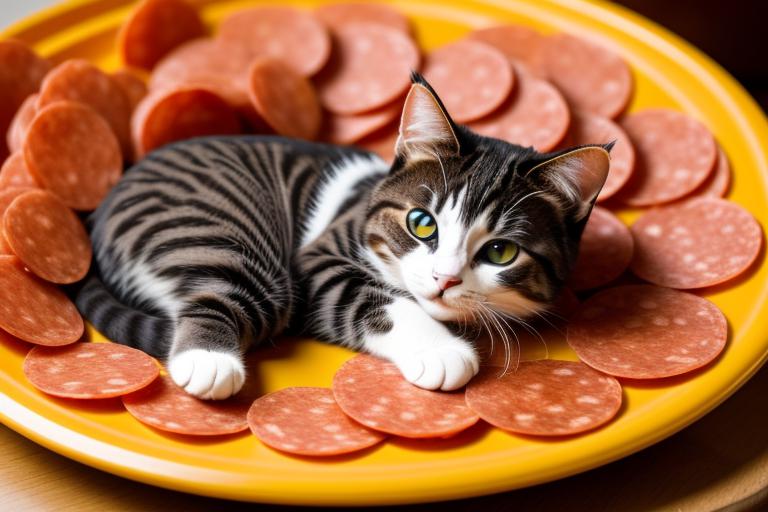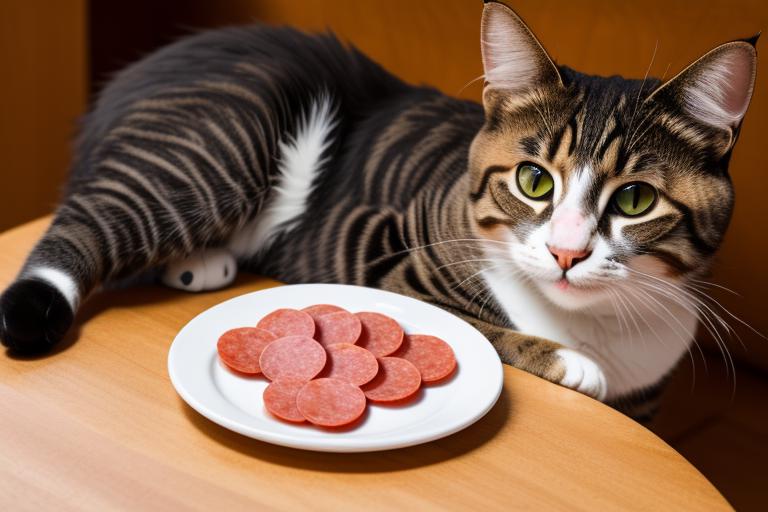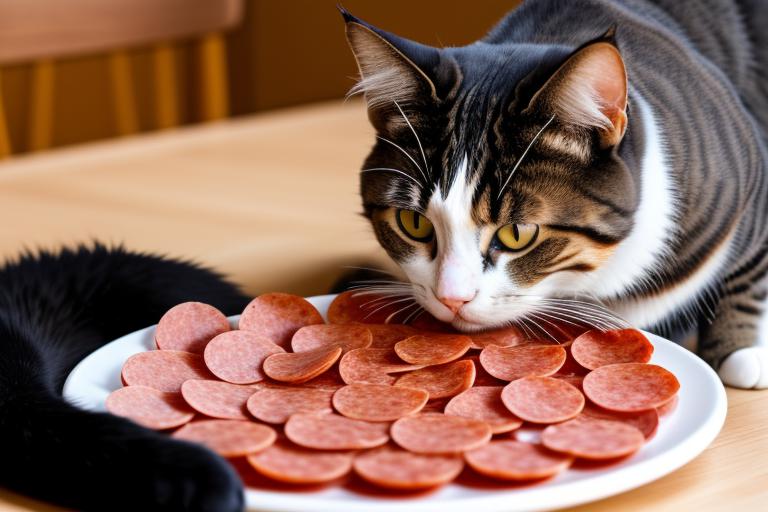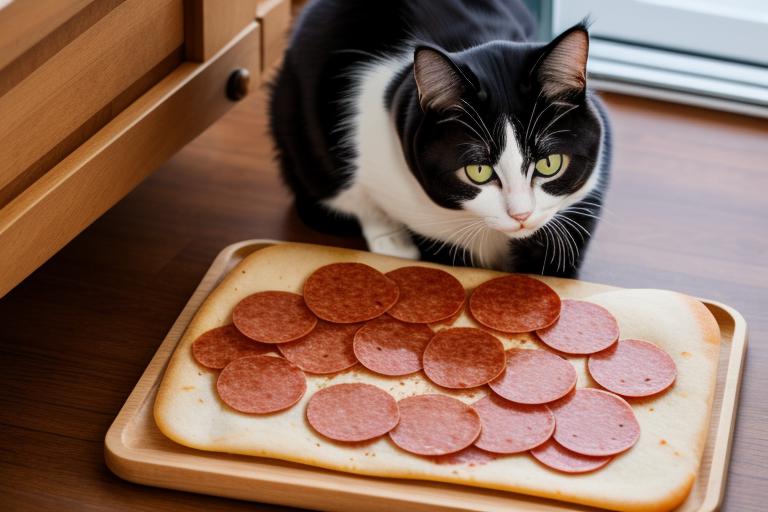Have you ever wondered if it’s safe to share a slice of pepperoni pizza with your feline friend? While it may seem tempting to treat your cat to a taste of this savory delight, it’s important to consider whether cats can actually eat pepperoni.
The answer is not as straightforward as you might think. In this discussion, we will explore the potential risks and benefits of feeding pepperoni to cats, taking into account their unique nutritional needs and digestive systems.
So, before you reach for that pepperoni slice, let’s dig deeper into this intriguing topic.
Nutritional Value of Pepperoni for Cats
Pepperoni has little to no nutritional value for cats. Cats are obligate carnivores, which means that they need a diet primarily consisting of meat. Pepperoni, on the other hand, is a processed meat product that’s high in fat, sodium, and spices. These ingredients can be harmful to cats and may lead to digestive issues, such as upset stomach or diarrhea.
Additionally, pepperoni contains ingredients like garlic and onion, which are toxic to cats. These ingredients can damage their red blood cells and cause anemia. Feeding your cat pepperoni regularly or in large quantities can have serious health consequences.
If you want to treat your cat, it’s best to stick to cat-approved snacks that are specifically formulated for their nutritional needs. There are many healthy options available, such as freeze-dried chicken or turkey treats, which provide a good source of protein without the harmful additives found in pepperoni.
Potential Risks of Feeding Pepperoni to Cats

Feeding your cat pepperoni can pose potential risks to their health and well-being. While cats are obligate carnivores and can eat some types of meat, pepperoni isn’t recommended for their diet.
Pepperoni is high in fat, sodium, and spices, which can lead to various health issues in cats. One of the main risks of feeding pepperoni to cats is its high fat content. Cats have a limited ability to digest and metabolize fat, and consuming excessive amounts can lead to pancreatitis, a painful and potentially life-threatening condition.
Additionally, the high sodium content in pepperoni can disrupt your cat’s electrolyte balance and lead to dehydration. Moreover, pepperoni often contains spices like garlic and onion, which are toxic to cats. These ingredients can cause damage to their red blood cells and lead to anemia. Symptoms of onion or garlic poisoning in cats may include weakness, vomiting, and pale gums.
Furthermore, pepperoni is a processed meat product, which means it may contain additives, preservatives, and artificial ingredients. These additives can be harmful to cats and may cause gastrointestinal upset or allergic reactions.
To ensure your cat’s health and well-being, it’s best to stick to a balanced and species-appropriate diet specifically formulated for cats. If you suspect your cat has ingested pepperoni or any other harmful food, it’s important to contact your veterinarian immediately.
Digestive System and Pepperoni: Can Cats Handle It?

Cats may struggle to digest pepperoni due to its high fat content and potential for causing digestive issues. The digestive system of cats is designed to process a diet that’s high in protein and low in carbohydrates. While cats are obligate carnivores and can handle a certain amount of fat in their diet, excessive fat intake can lead to gastrointestinal problems.
Pepperoni is a type of cured and processed meat that’s high in fat. Consuming large amounts of fat can result in an upset stomach, diarrhea, and even pancreatitis in cats. The pancreas plays a crucial role in digesting fats, and if it becomes inflamed due to excessive fat consumption, it can lead to serious health complications.
Furthermore, the high salt content in pepperoni can also cause issues for cats. Cats require a low sodium diet, and excessive salt intake can lead to dehydration, increased thirst, and kidney problems.
In addition to the potential digestive issues, pepperoni also contains other ingredients that may be harmful to cats. These include spices like garlic and onion powder, which can be toxic to felines.
Alternatives to Pepperoni for Your Feline Companion
If you’re looking for a healthier alternative to satisfy your feline companion’s cravings, there are plenty of options that can be just as delicious as pepperoni. Instead of giving your cat pepperoni, which can be high in sodium and fat, consider offering them lean pieces of cooked chicken or turkey. These meats are a great source of protein and can be a tasty treat for your furry friend.
Another alternative to pepperoni is fish. Cats are natural carnivores, and many enjoy the taste of fish. You can give your cat small, cooked pieces of fish such as salmon or tuna. Just make sure to remove any bones and cook the fish thoroughly to avoid any potential health risks.
If your cat enjoys the taste of cheese, you can also offer them small amounts of low-fat cheese as a treat. Just be mindful of the lactose content and only give them a small piece to avoid any digestive issues.
Lastly, if you’re looking for a plant-based option, you can try giving your cat small amounts of cooked vegetables such as carrots or green beans. These can provide some added fiber and nutrients to their diet.
Moderation Is Key: Feeding Pepperoni to Cats Safely

To ensure the safety of your feline friend, it’s important to feed pepperoni to cats in moderation. While cats can technically eat pepperoni, it isn’t recommended to make it a regular part of their diet. Pepperoni is high in fat, sodium, and spices, which can be harmful to cats if consumed in large quantities.
Feeding them too much pepperoni can lead to digestive issues, such as vomiting or diarrhea. Additionally, the spices and seasonings used in pepperoni, such as garlic and onion, can be toxic to cats. If you do decide to give your cat a small amount of pepperoni as an occasional treat, make sure it’s plain and free of any spices or seasonings. Remove any excess fat and cut it into tiny pieces to prevent choking hazards.
It’s important to note that every cat is different, and some may have sensitivities or allergies to certain ingredients in pepperoni. Therefore, it’s always best to consult with your veterinarian before introducing any new foods into your cat’s diet.
Conclusion
In conclusion, while cats can technically eat pepperoni, it isn’t recommended due to its high fat and sodium content. Feeding pepperoni to cats can lead to digestive issues and potential health risks.
It’s best to opt for healthier alternatives or stick to a balanced feline diet to ensure their overall well-being. Remember, moderation is key when it comes to treating your furry friend.

